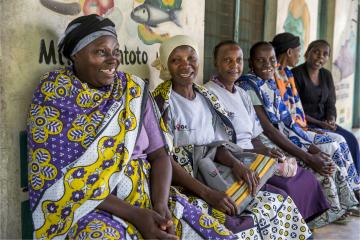
Gender and Economic Agency Initiative funds nineteen new research projects on women’s work

Policymakers and the private sector increasingly recognize the importance of improving women’s labor market and economic outcomes, and are eager to implement policies that support women’s economic agency. However, a lack of evidence on effective interventions, as well as where and why they work, makes it challenging to implement policies that meaningfully improve the lives of women.
In response, J-PAL’s Gender and Economic Agency Initiative (GEA), launched in 2020, is pushing forward innovative research on strategies to promote women’s work and enhance women’s economic agency.
The Covid-19 pandemic continues to negatively impact women’s labor force participation and economic agency around the world. Recent surveys have found that, across the globe, women-owned micro- and small businesses have closed at higher rates than those owned by men. School closures and increased care duties caused by the pandemic have been challenging for women entrepreneurs and workers, as women disproportionately share the burden of these responsibilities. Meanwhile, surveys from South Asia and Latin America show that the sectors that most commonly employ women have experienced the largest reductions in employment.
Testing new interventions to support working women and address restrictive gender norms
Covid-19-induced setbacks to women’s economic agency has amplified gender inequities that pre-date the pandemic. It has also increased the urgency to better understand these inequities and to identify effective strategies to address them and to support working women.
While we have some insights from researchers and policymakers on how to support women workers during the pandemic, many open questions remain. As part of our efforts to fill that evidence gap, we are pleased to share an update on GEA’s growing portfolio of cutting-edge research projects.
With the generous support of the Bill & Melinda Gates Foundation and the Target Foundation, GEA has completed its second full funding round, supporting nineteen research teams to produce evidence that addresses critical knowledge gaps on what works to support women’s economic agency.
The projects are located throughout South Asia and East Africa and fall under three priority research topics: improving workplace arrangements and labor policies to promote formal and informal employment for women; enhancing women’s labor potential and work readiness; and addressing restrictive gender norms and attitudes related to women’s work. The projects funded in the Summer 2021 round build upon the set of exciting projects funded by GEA earlier this year. Click on the sub-categories below to explore the projects within each area.
Projects on workplace arrangements and labor policies to promote formal and informal employment for women:
- Friendly Workplaces for Working Mothers: Do Lactation Rooms Promote Women's Labor Force Participation and Productivity? (Kenya)
- Differences in Competition and the Gender Wage Gap: Experimental Evidence from Tanzanian Factories
- A Field Experiment to Improve Women's Mobility in Pakistan
- Bringing Work Home: Internet-Mediated Gig Work & Women's Employment (India)
- Can Workfare Keep Women Working During a Crisis? The Long-Term Effects of Female-Friendly MGNREGS Reform During COVID-19
- Child Care and Educated Women’s Labor Market Behavior: Evidence from Kerala (India)
- Whistleblowing and Worker Well-being: Evidence from Bangladesh's Garments Sector
- The Role of Informal Labor Arrangements in Facilitating Formal Employment for Women (India)
Projects on enhancing women’s labor potential and work readiness:
- Does Group-based Therapy (With or Without Cash Transfers) Improve Economic Outcomes for Adolescent Females in Uganda?
- The Community-, Household-, and Individual-Level Impacts of Female Industrial Work (Ethiopia)
- Broadening Women's Job Search to Improve Their Employment (India)
- Career and Leadership Skill-building for Muslim Women in India
Projects on addressing restrictive gender norms and attitudes related to women’s work:
- Debiasing Law Enforcement: Effects of an Expressive Arts Intervention in India
- Impact of Education of the X&Y Chromosomes on Women’s Agency and Experience of Domestic Violence (India)
- Evaluating a Secondary-School Program to Change Gender Attitudes in India Five Years Later
- Social Norms and Firm Productivity: Evidence from Bangladeshi Knitwear Factories
- The Gender (Dis)comfort Gap: The Effects of Gender on Everyday Interactions in Pakistan
- The Power of Elites in Encouraging Women's Work: Evidence from Rohingya Refugee Camps (Bangladesh)
- A New Coworker: Better a Male, a Female or a Friend? (Uganda)
Involving local researchers
We believe that research is strengthened when it is informed by deep contextual knowledge and diverse perspectives, which is why J-PAL is committed to increasing diversity in our research network and strengthening inclusion in our research and partnerships. GEA has made concerted efforts to strengthen the body of research through partnership with the Indian Scholars Program (ISP), expanding funding opportunities to Indian scholars for research in India, and through supporting research collaborations between local researchers and policymakers.
ISP was launched in 2021 by J-PAL South Asia. Similar to J-PAL’s African Scholars Program, ISP provides research funding, training, and networking opportunities for researchers and academics in India, with the goal of supporting them to drive India's development policy research agenda.
GEA earmarked grant money in the Summer 2021 funding cycle for high-quality research proposals from the ISP, and we were able to fund two exciting projects by Indian Scholars, which examine the impacts of gender norms and explore how child care impacts women’s labor force participation. ISP scholars with funded projects will receive support from the J-PAL South Asia office for the duration of their studies through mentorship, webinars, and training opportunities.
What’s next for GEA
GEA-funded research will help policymakers identify evidence-informed strategies to increase women’s economic empowerment. We look forward to sharing and synthesizing research findings from our portfolio, as well as expanding the portfolio in upcoming funding cycles. GEA is hosting our next request for proposals this winter, with an eye towards funding projects in two of our new priority areas, Southeast Asia and Central America. More details on the funding opportunities, deadlines, and eligibility can be found on our website.
If you are interested in partnering with us to shape research and policies on women’s work, please contact [email protected].


